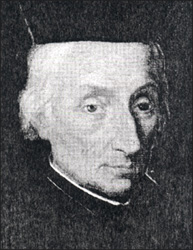General from 1706 to 1730
The delegates convened on January 20, 1706 and on the 31st of that month elected Michelangelo Tamburini, the 58-year-old Italian from Modena as the 14th General. Though the foreign missions were a prime concern of almost every General, Tamburini went at it with vigor. During his generalate the famous Paraguay Reductions were encouraged and promoted. He established missions in the Near East and in the Far East he gave his approval to the "de Nobili" experiment in India. These seeming innovations did not set well with the commercial interests of the great European investments. There was an undercurrent of opposition against the Jesuits which would eventually lead to the Suppression of the Society within the next half-century. The Jansenists, too, piqued by their reversals engineered by the Jesuits were in the first row accusing the Jesuits of various nefarious schemes. The missions, especially, were accused of drawing mission lands away from the Church and away from the influence of Portugal, Spain, and France. Tamburini, however, made a special visit to the Pope to assure him of the Society's complete compliance with his directives and steadfast loyalty to the Church. During
the 24 years and one month of his Generalate, Tamburini was the constant
target of slander and calumny and frequently lampooned and caricatured
viciously in tracts published by the enemies of the Society. They sought
to insult him with cynical cartoons in every attack. Jesuits were accused
of betraying the Church in mission countries. But worst of all were the
factions that split the Society, itself, and certainly weakened it for
the blow which was to come. Attacked from all sides and worn out by confusion
and accusation that he was not keeping his Jesuits in order and having
submitted to the burden for 24 years he died at the age of 82 on February
28, 1730. After his funeral in the Gesù his remains were carried
to the crypt and laid to rest.
|
